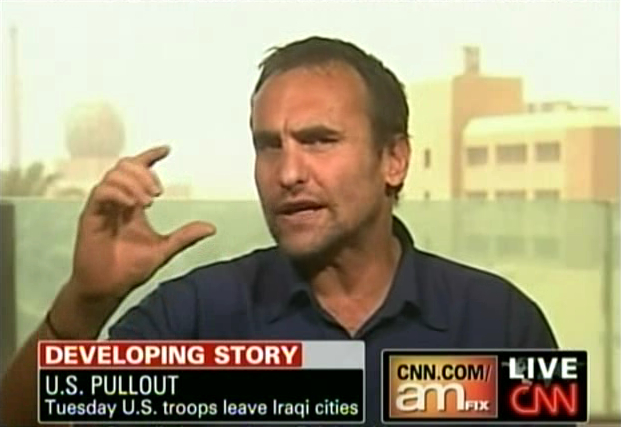AAM: "I suspect there may be a high price for that sovereignty, but the Iraqis are clearly ready to pay for it."
June 29, 2009

Length: 3:35
LARGE (41.5 MB) ----- SMALL (4.4 MB)
Michael talks to Kiran Chetry about the handover and how Iraqis are feeling about it.
KIRAN CHETRY: Nineteen minutes past the hour now. Welcome back to the Most News in the Morning.
We're just 24 hours away from a major benchmark in the more than six-year-old Iraq war. Tomorrow is the deadline for U.S. troops to pull out of Iraq's major cities and to turn security operations over to Iraqi forces.
CNN's Michael Ware is live for us in Baghdad with more on this benchmark. And what does it really mean going forward for the U.S. military mission in Iraq, Michael?
MICHAEL WARE, CNN INTERNATIONAL CORRESPONDENT: Well, Kiran, first and foremost, let's -- I mean, let's try and get our heads around what exactly this means. This is formally the end of the U.S.-led war in Iraq. America will no longer be in charge.
I mean, this is a war that the Bush administration started. As President Obama calls it, the war of choice. Well, in the dying days of the Bush administration, they signed this international agreement with Baghdad that dictated the timetable for the ending of this war. And June 30, tomorrow, is the first grand step.
Now what happens is that by that time, by tomorrow, and it's been under way for six months, of course, all U.S. troops will have pulled out of Iraq's cities and bases, cities and towns, and they retreat to pre-designated bases.
There'll still be a few Americans out there, advisers embedded with Iraqi units. There'll be some partnered patrols, and I'm sure we're going to see some joint operations from time to time.
Bottom line, America is no longer in charge as of tomorrow morning and that the Iraqis are in control and America can only operate within the urban centers at the invitation or with the permission of the Iraqi government. In some ways, this is very much an end of the American phase of the war, Kiran.
CHETRY: Interesting thing, this is happening at a time where we've been seeing increased violence, these suicide bombings, one of the deadliest taking place within the last week. How do the civilians feel about this? I mean, you have said so many times that they just want to be safe. They want to be able to feel like they can walk around their neighborhoods and be safe, their kids can go to school, that they can earn a living. So what are we dealing with in terms of where that leaves the country?
WARE: Gee, you know, you'd think an answer -- a question like that would have a simple answer. But as always, this is Iraq, it's very complicated.
This has been a long running bombing campaign. Al Qaeda in Iraq and its allies trying to bring Iraq back to sectarian civil war.
Yes, they yearn for security. Yet, they're the minority that wants the Americans to stay in the streets. The vast majority of Iraqis are in a celebratory mood.
State TV, Iraqi state TV currently is fonted with a countdown to the handover. Tomorrow is a national holiday. These people are celebrating that finally foreign troops will be out of their streets, whether those troops were well-intended or not. Foreign tanks will be gone, that the Iraqis will finally be in charge. I suspect there may be a high price for that sovereignty, but the Iraqis are clearly ready to pay for it, Kiran.
CHETRY: And tomorrow we'll get our first look at how things are going. Michael Ware for us this morning from Baghdad. Thanks so much.
